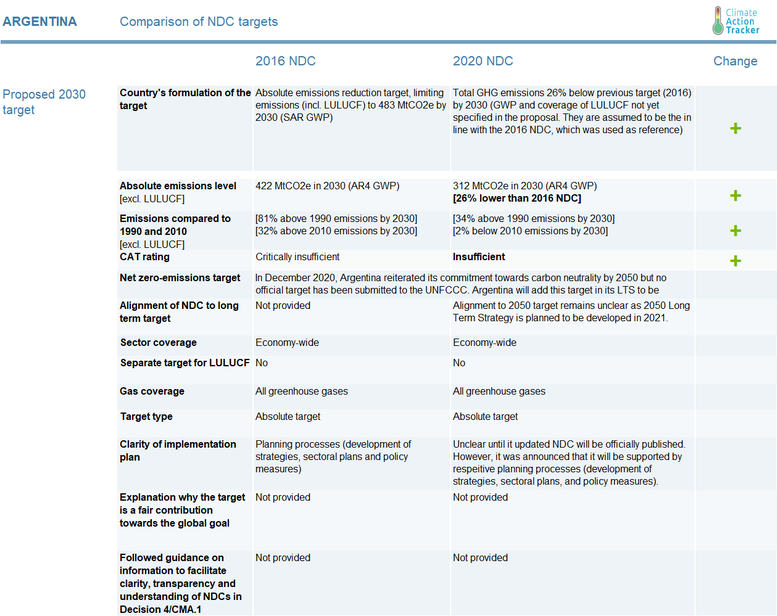CAT Climate Target Update Tracker
Argentina
Summary
Argentina proposed NDC update at the Climate Ambition Summit
The government of Argentina announced its intention to update its Nationally Determined Contribution (NDC) on 12 December 2020. The forthcoming update will strengthen the country’s 2030 target, which now aims to reduce absolute emissions by 26% below its previous target. The updated target represents a significant improvement from the previous unambitious target (which was consistent with warming of greater than 4°C), going even beyond the conditional target in the previous NDC.
The process of updating the NDC was carried out in parallel and informed by the long-term strategy (LTS), which has the objective of Argentina being carbon-neutral by 2050. The greater ambition in the new NDC redirects Argentina onto a more suitable path to achieve its long-term target. However, its level of alignment with the LTS is unclear and depends on further details in the as yet unpublished NDC, the sectoral plans currently under development and the role of the land sector in achieving the target. As of December 2020, Argentina had not yet submitted its LTS to the UNFCCC, but states it intends to before the end of the year.
The newly proposed NDC target falls into the CAT’s ‘Insufficient’ category, improving its rating by two categories with respect to the previous target in the NDC of 2016.
CAT analysis of NDC announcement


On 12 December 2020, President Alberto Fernandez announced Argentina’s enhanced NDC target of 26% reduction below its previous NDC at the Climate Ambition Summit. This target is a significant improvement from the previous unambitious target.
The previous target, submitted in 2016, included two absolute emissions reduction targets for 2030: an unconditional target that limits economy-wide emissions to 483 MtCO2e in 2030 and a conditional target to limit emissions to 369 MtCO2e in 2030 (incl. LULUCF and in SAR GWP). The proposed NDC update of 26% reduction below previous unconditional target would limit total emissions to 357 MtCO2e in 2030 (incl. LULUCF and in SAR GWP), and is also 3% lower than previous conditional target.
According to our calculations and assuming a similar contribution of LULUCF emissions as in the previous target, the updated target is equivalent to 312 MtCO2e in 2030 (excl. LULUCF and in AR4 GWP) and represents an increase in emissions of 34% above 1990 levels and a 2% decrease below 2010 levels. The proposed NDC target falls into the CAT’s ‘Insufficient’ category, improving the CAT rating of the previous NDC by two levels, from its previous “Critically Insufficient” rating.
Although the conditional target was not addressed in the announcement, President Alberto Fernandez stated that the proposed target also considers financial needs to meet these objectives, estimated to USD 15 billion for both mitigation and adaptation measures, including the need for climate finance and international support.
As defined in the National Plan of Adaptation and Mitigation of Climate Change, the process of updating the NDC was carried out in parallel and informed by development of the long-term strategy (LTS). In the LTS, which has not been yet submitted to the UNFCCC, Argentina has the objective of becoming net-zero CO2 by 2050. The greater ambition in the new NDC redirects Argentina onto a more suitable path to achieving its long-term decarbonisation target. However, the level of alignment remains unclear and depends on further details in the upcoming NDC publication and sectoral plans currently under development.
Although the new target shows a rise in climate mitigation ambition, both the NDC and LTS targets need to be reflected in the short-term with concrete actions and sectoral plans, such as supporting low-carbon recovery measures in response to the COVID-19 pandemic, including phasing out the exploration and extraction of fossil fuels such as the Vaca Muerta gas field, eliminating fossil fuel subsidies, and addressing the country’s increasing dependency on meat production and exports.
Based on the Climate Change Adaptation and Mitigation Minimum Budget Law and the cross-ministerial Climate Change Cabinet that leads the development of sectoral plans, Argentina has recently adjusted its governance structure to better articulate the planning and implementation of ambitious targets.
Argentina has indicated it plans to formally submit its updated NDC to the UNFCCC before 31 December 2020. We expect the document to contain more detailed information on mitigation plans and the relative contribution of various sectors, which would allow us to provide a more detailed analysis of the country’s target.
Links
Stay informed
Subscribe to our newsletter
